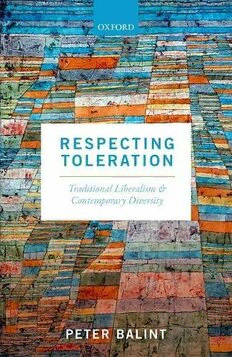
Respecting toleration : traditional liberalism and contemporary diversity PDF
Preview Respecting toleration : traditional liberalism and contemporary diversity
OUPCORRECTEDPROOF–FINAL,17/11/2016,SPi RESPECTING TOLERATION Thequestionoftolerationmattersmorethanever.Thepoliticsofthetwenty- firstcenturyisrepletewithboththesuccessesand,alltoooften,thefailuresof toleration. Yet a growing number of thinkers and practitioners have argued against toleration. Some believe that liberal democracies are better served by differentprinciples,suchasrespectof,orrecognitionfor,people’swaysoflife. Others argue that because the liberal state should be entirely neutral or indifferent towards people’s ways of life, it can no longer be tolerant—it has nogroundsonwhichitcanobject,andsothereisnothinglefttotolerate. Respecting Toleration provides a new, original, and provocative take on the question of toleration and its application to the politics of contemporary diversity.PeterBalintarguesforboththeconceptualcoherenceandnormative desirability of toleration and neutrality. He argues that it is these principles whichbestrealizethebasicliberalgoodofpeoplelivingtheirlivesastheysee fit,ratherthanappealingtoprinciplesofrecognitionorrespectfordifference. While those who criticized liberalism’s failings in dealing with the claims of diversity had justification, it is the tenets of traditional liberalism that hold theanswer.Respecting Tolerationarguesthat ifone caresaboutpeople living divergent lives, then it is liberal toleration that should be respected by legis- latorsandpolicy-makers,andnotpeople’sdifferences. OUPCORRECTEDPROOF–FINAL,17/11/2016,SPi OUPCORRECTEDPROOF–FINAL,17/11/2016,SPi Respecting Toleration Traditional Liberalism and Contemporary Diversity PETER BALINT 1 OUPCORRECTEDPROOF–FINAL,17/11/2016,SPi 3 GreatClarendonStreet,Oxford,OX26DP, UnitedKingdom OxfordUniversityPressisadepartmentoftheUniversityofOxford. ItfurtherstheUniversity’sobjectiveofexcellenceinresearch,scholarship, andeducationbypublishingworldwide.Oxfordisaregisteredtrademarkof OxfordUniversityPressintheUKandincertainothercountries ©PeterBalint2017 Themoralrightsoftheauthorhavebeenasserted FirstEditionpublishedin2017 Impression:1 Allrightsreserved.Nopartofthispublicationmaybereproduced,storedin aretrievalsystem,ortransmitted,inanyformorbyanymeans,withoutthe priorpermissioninwritingofOxfordUniversityPress,orasexpresslypermitted bylaw,bylicenceorundertermsagreedwiththeappropriatereprographics rightsorganization.Enquiriesconcerningreproductionoutsidethescopeofthe aboveshouldbesenttotheRightsDepartment,OxfordUniversityPress,atthe addressabove Youmustnotcirculatethisworkinanyotherform andyoumustimposethissameconditiononanyacquirer PublishedintheUnitedStatesofAmericabyOxfordUniversityPress 198MadisonAvenue,NewYork,NY10016,UnitedStatesofAmerica BritishLibraryCataloguinginPublicationData Dataavailable LibraryofCongressControlNumber:2016945277 ISBN 978–0–19–875859–4 PrintedinGreatBritainby ClaysLtd,StIvesplc LinkstothirdpartywebsitesareprovidedbyOxfordingoodfaithand forinformationonly.Oxforddisclaimsanyresponsibilityforthematerials containedinanythirdpartywebsitereferencedinthiswork. OUPCORRECTEDPROOF–FINAL,17/11/2016,SPi Acknowledgements The ideas in this book have been percolating for some time, and well before I embarked on an academic career. They started with a scepticism of some of the more heavy-handed multicultural policies—especially after viewing empirical multiculturalism in action. This scepticism was then joined by a defensivenesstowardstoleration—Iwastakenabackbythenumberofpeople whoactivelydisparagedtheterm.Ofcourse,whenonereadsandsubsequently writes into the academic literature, these issues become much more nuanced andcomplex.Nevertheless,Ihaveprobablynotstrayedtoofarfrommyinitial concerns,evenifagreatdealofconceptualanalysisnowprecedesthem.While this is squarely a book for an academic audience, my (perhaps vain) hope is thattheideasandwritingareaccessibleenoughforatleastsomeofittofilter backouttothepracticallevelwhichinitiallyinspiredtheproject. Along the way, I have been enormously assisted by many people and institutions. Let me begin by thanking those who have very kindly read and commented on all, or major parts of, the manuscript: Ned Dobos, Toni Erskine, GeoffreyBrahmLevey, Stephanie Collins,JohnBalint,JohnDryzek, Sune Lægaard, Andrew Jason Cohen, Miriam Ronzoni, Tiziana Torresi, AnthonyHall,andLukeGlanville. I am also grateful for suggestions, critical comments, and assistance from: Deane-Peter Baker, Jennifer Balint, Ayelet Banai, Christian Barry, Rainer Bauböck, Enrico Biale, Barbara Buckinx, Anthony Burke, Ian Carter, Emanuela Ceva, Richard Childs, John Connor, Stephen Coleman, Katherine Curchin, Keith Dowding, Lindy Edwards, Derek Edyvane, Lina Eriksson, Luara Ferracioli, Bob Goodin, Sophie Guérard de Latour, Maria Paola Ferretti, Rainer Forst, Stefan Gosepath, Rey Hopkins, John Horton, Elanor Huntington,PeterJones,EszterKollar,WillKymlicka,HollyLawford-Smith, David Lovell, Terry MacDonald, Matt Matravers, Susan Mendus, Michaelis Michael, David Miller, Tariq Modood, Piero Moraro, Gavin Mount, Glen Newey, Ephraim Nimni, Kieran Oberman, Yin Paradies, James Pattison, Anne Pederson,HelenPringle,JonathanQuong,KimRubenstein,ChristianSchemmel, Daniel Schuurman, Liam Shields, Nicholas Southwood, Tim Soutphommasane, LauraValentini,StephendeWijze,JoWolff,KerriWoodsandFedericoZulo. Mark Evenhuis and Rhiannon Neilsen provided valuable research assist- ance which was enabled by funds from a Freilich Foundation (ANU) Early CareerResearchGrantandfromTheSchoolofHumanities&SocialSciences (UNSWCanberra). OUPCORRECTEDPROOF–FINAL,17/11/2016,SPi vi Acknowledgements Institutionally, this work was undertaken at UNSW Canberra, where I am very grateful to have such a supportive environment. I have also benefited from visiting fellowships at the Centre for Advanced Studies ‘Justitia Ampli- ficata: Rethinking Justice—Applied and Global’ (University of Frankfurt am Main)—where we were very well looked after at the Forschungskolleg HumanwissenschafteninBadHomburg—TheManchesterCentreforPolitical Theory(Universityof Manchester), The Departmentof Politics(University of York),TheSchoolofSocialSciences&InternationalStudies(UNSW),andThe Centre for Applied Philosophy and Public Ethics (ANU). In Canberra, the NationalLibraryofAustraliaprovidedanexcellentresearchenvironment. At Oxford University Press, I am grateful for the assistance of Dominic Byatt, Olivia Wells, and the editorial and production teams, and for the feedbackfromtheiranonymousreviewersandreaders. Chapter3 is an expanded and much revised version of ‘Identity Claims: WhyLiberalNeutralityistheSolution,NottheProblem’,PoliticalStudies,63(2) (2015):495–509;Chapter4isanexpandedandmuchrevisedversionof‘Actsof Tolerance: A Political and Descriptive Account’, European Journal of Political Theory,13(3)(2014):264–81;andChapter5isanexpandedandmuchrevised version of ‘Against Respecting Each Others’ Differences’, Journal of Applied Philosophy, 30(3) (2013): 254–67. I thank the publishers of these journals for theirpermissiontousetheseworkshere. Finally, my thanks go to both the Balint and Hopkins families for their continued support—with an enormously big thank you to my wonderful partner Bec. I dedicate this book to Tala and Tyrus—may you grow up to liveinatolerantsociety. OUPCORRECTEDPROOF–FINAL,17/11/2016,SPi Contents 1. ATolerantSociety 1 ThreeChallengesforToleration 2 Diversity 6 AccommodatingDiversity 8 JustifyingToleration 10 TraditionalLiberalismandToleration 13 TwoTypesofAgent:StateandCitizen 15 TheRoleofPrinciples 18 OutlineoftheBook 20 2. UnderstandingPoliticalToleration 23 Being‘Tolerant’ 25 SpecificActsofTolerance 28 TolerationasaGeneralPoliticalPractice 28 TolerationandStateNeutrality 32 FurtherChallengestoPoliticalToleration 35 UnderstandingStateObjection 35 LocatingStatePower 36 The‘SymmetryThesis’ 38 AlternativeSolutionstotheProblemofPoliticalToleration 41 SeparatingtheSiteofPowerfromtheSiteofObjection 42 TransformativeIdeals 45 The‘RespectConception’ofToleration 48 Conclusion 49 3. ActiveIndifference:ANeutralandAccommodatingState 51 ChallengingNeutrality 53 ConceptionsofNeutrality 55 WhyCareaboutNeutrality? 58 ActiveIndifference 60 Why‘HandsOff’IsBetterthan‘HandsOn’ 64 IdentityandRecognition 70 NotDistinguishingbetweenMerePreferencesandDeeply HeldBeliefs 72 Conclusion 75 OUPCORRECTEDPROOF–FINAL,17/11/2016,SPi viii Contents 4. ToleranceandtheCitizen 77 AnActofTolerance 78 ObjectingtoSomeThing 80 ThePower(IncludingBothOpportunityandWillingness) toInterfereNegativelywiththeThingorItsHolder 81 IntentionallyNotNegativelyInterferingwiththeThingor ItsHolder 84 ReducingIntolerance 88 ToleranceandtheState 94 ATolerantDisposition 96 Conclusion 97 5. AgainstRespectingEachOthers’Differences 99 AnObligationtoRespectDifference? 101 AppraisalRespectforDifference 104 RecognitionRespectforDifference 106 DirectlyRespectingParticularDifferences 108 Respect-for-PersonsEntailingRespectforDifference 109 TryingtoRespect 112 BeingDeemed‘Respect-worthy’ 114 ToleranceandRespect 115 Conclusion 119 6. PractisingToleration 121 TheWeightinessofNeutrality 122 WelfareRedistribution 123 DefendingtheNation 125 DealingwithDifference 130 Mosques 130 Driver’sLicencePhotos 133 Discretion 135 Indigeneity 137 TheBoundariesofToleration 140 Conclusion 143 7. Conclusion 145 References 149 Index 163 OUPCORRECTEDPROOF–FINAL,15/11/2016,SPi 1 A Tolerant Society Examplesoftolerationanditsabsencearenothardtofind.AfterSiniSaarela, aFinnishGreenpeaceactivistandvegan,wasarrestedbyRussianofficialsand chargedwithpiracyin2013,shewasapparentlystarvinginprisonbecauseher dietary requests were not being met. In the same year a United States (US) FederaljudgeorderedtheFloridaprisonsystemtoreinstatetheirKoshermeal planforallprisonerswitha‘sincerereligiousbasis’.1IntheUnitedKingdom (UK), Hull Council seems to have tried to conceal its Muslim women-only swimmingsessionsbytellingotherusersoftheBeverleyRoadBathsthatthey were closed for staff training. But in the Australian state of Victoria, several local councils successfully applied for exemptions from anti-discrimination legislation to run such women-only swimming classes.2 Or take the case of gender identity: in 2013 the Education Department of the US state of Massachusettsruledthattransgenderstudentscanaccessthelockerroomand changingfacilitythatcorrespondswiththeirowngenderidentity.Andsimilarly in 2013 the city council of Brighton and Hove in the UK announced its intentiontodegenderitspublictoilets,statingthatitwishedtopromote‘gender neutrality’and‘buildfacilitieswhichareopentoall,regardlessofsex’.3Ortake the caseof racist abuse.In 2014,inwhat isanalltoocommonevent,a young motherwassubjectedtoracistabuseonaDublinbusasshetravelledwithher three-month-old baby. Earlier, on a Melbourne bus, Fanny Desaintjores was subjectedtoracistabusebyotherpassengersaftershestartedsinginginFrench as she travelled home.4 Or take the case of traditional pastimes and animal rights.TraditionalfoxhuntinghasbeenillegalintheUKsince2004,butoverin Ireland traditional hunts still continue. And finally, take the case of cultural/ religiouspracticesand theirimpactonothers.InPhiladelphia,the StJohn the BaptistRomanCatholicChurchwastoldits7a.m.bellwastooloudandcould leadtoa$700dailyfineifitviolatedthecity’snoiseordinance—awomanhad 1 UPI(2013);TheJewishDailyForward(2013);UnitedStatesCourts(2013). 2 Geeves(2010);News.com.au(2012). 3 Jeffreys(2014:44). 4 Ward(2014);AustralianHumanRightsCommission(2012).
